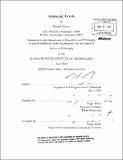Epistemic levels
Author(s)
Greco, Daniel (Daniel Louis)
DownloadFull printable version (6.883Mb)
Other Contributors
Massachusetts Institute of Technology. Dept. of Linguistics and Philosophy.
Advisor
Roger White.
Terms of use
Metadata
Show full item recordAbstract
In this dissertation I defend some controversial "level-bridging" principles in epistemology. In the first chapter, I defend the KK principle-the principle that if one knows that P, then one knows that one knows that P. I argue that saying plausible things about higher-order interpersonal knowledge requires rejecting some popular arguments against KK, and that many apparent counterexamples to KK can be explained away by appeal to contextualism about knowledge. In the second chapter, I take up the topic of epistemic akrasia-the state of believing some proposition P, while believing that one oughtn't believe that P. While many take for granted that epistemic akrasia is always irrational (and least implicitly endorse a level-bridging principle in the process), there are some apparently powerful arguments for holding that epistemic akrasia must sometimes be rational. I argue that once we get clearer on the descriptive/psychological question of what sort of state epistemic akrasia is, we can resolve this puzzle in favor of the intuitive view that epistemic akrasia is a species of irrationality. In the third chapter, I appeal to level-bridging principles to respond to some recent arguments to the effect that certain epistemological debates are somehow non-substantive, or merely verbal. If my argument succeeds, this constitutes a kind of indirect support for level-bridging principles-if we think that epistemological debates typically are substantive, we face some pressure to adopt level-bridging principles to explain this.
Description
Thesis (Ph. D. )--Massachusetts Institute of Technology, Dept. of Linguistics and Philosophy, 2012. Cataloged from PDF version of thesis. Includes bibliographical references (p. 79-86).
Date issued
2012Department
Massachusetts Institute of Technology. Department of Linguistics and PhilosophyPublisher
Massachusetts Institute of Technology
Keywords
Linguistics and Philosophy.